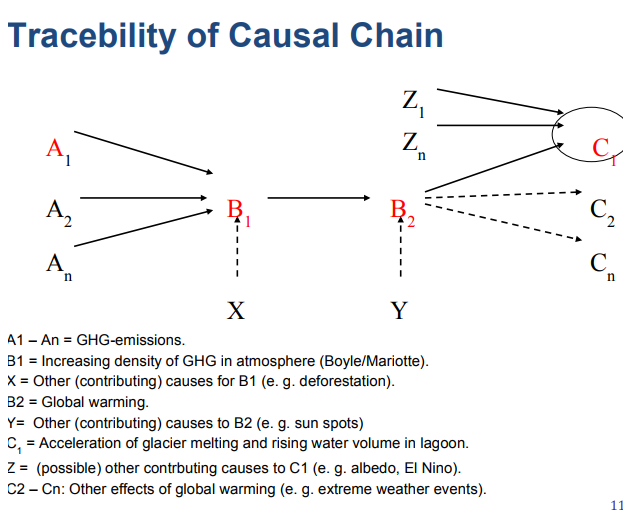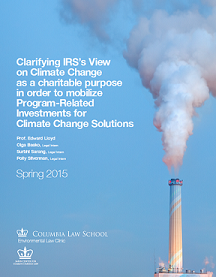
Over 150 business climate collaborations have arisen in recent years as the private sector has begun to grapple with its role in combatting climate change. The functions of these associations range from establishing shared net zero targets to developing frameworks for carbon accounting. As these groups have proliferated, they have faced scrutiny from both climate change activists, who have expressed concerns about the voluntary nature of most agreements and the associated potential for greenwashing, and climate change denialists, who decry them as political efforts to hasten the decline of the fossil fuel industry.
The Net Zero Banking Alliance (“NZBA”) is one such organization, convened with United Nations support to align the banking industry with a 2050 net-zero carbon emissions target. On October 19th, 2022, a coalition of 19 Republican attorneys general (“AGs”) announced an investigation into six NZBA signatories: Bank of America, Citigroup, Goldman Sachs, JPMorgan Chase, Morgan Stanley, and Wells Fargo (the “NZBA Investigation”). The AGs posit that the NZBA emissions reduction goals amount to a concerted effort to block fossil fuel companies from receiving financial services, and assert that the banks’ participation in the NZBA may run afoul of consumer protection and antitrust laws.
The NZBA Investigation is situated within a larger effort by Republican officials to resist the use of environmental, social, and governance (“ESG”) criteria in investment decisions. Related efforts include a 21-state coalition objecting to proposed SEC rules that would require increased disclosure with respect to ESG investment practices; a series of highly-publicized letters from a group of Republican AGs challenging the investment firm Blackrock with respect to its ESG analysis and related climate policies; and a joint investigation of 19 states led by Missouri into Morningstar and a subsidiary regarding its ESG ratings. Several of the AGs participating in the NZBA Investigation have also taken steps in their home states to boycott certain of the financial institutions they are now investigating. Those states have passed “Anti-ESG” laws, which seek to punish companies that offer investment products that restrict funding to fossil fuel companies, or which instruct state pension funds not to consider ESG factors in their risk assessments of investment opportunities. The NZBA Investigation signals an expansion of these anti-ESG efforts, as the first significant state challenge to emissions targets under antitrust and consumer protection laws. But is there a basis for these claims?
Antitrust Framework
Two principal federal antitrust statutes govern agreements among competitors: the Sherman Act of 1890, which prohibits monopolization and unlawful trade restraints, and the Clayton Act of 1914, which identifies additional prohibited conduct, including with respect to interlocking directorates, and mergers and acquisitions. Most states, including those participating in the NZBA Investigation, have parallel laws governing competitive behavior at the state level. These statutes proscribe unlawful conduct in general terms, establishing broad principles as to how markets should operate, leaving courts and regulatory authorities to inquire into the facts of a given challenged business practice.
Importantly, antitrust law distinguishes between concerted and independent action. The conduct of a single firm is unlawful only when it threatens actual monopolization. Concerted activity is judged more harshly than unilateral activity, and certain types of agreements – such as price fixing and market share allocation – are deemed so likely to harm competition that they are considered per se unlawful. By contrast, other agreements – such as mergers, or vertical arrangements – involve the potential to increase a firm’s efficiency, and are analyzed under a “rule-of-reason” to assess the overall effect of the behavior, including “pro-competitive” effects that may be beneficial to consumers.
The NZBA Investigation
The NZBA is comprised of 120 members, which together represent nearly 40% of global banking assets. Member banks pledge in a commitment statement to transition their operational greenhouse gas (“GHG”) emissions, as well as the GHG emissions attributable to their lending and investment portfolios, to align with net zero pathways by 2050. The banks pledge to develop interim 2030 GHG reduction targets as well.
The investigating AGs challenge the NZBA as a “massive worldwide agreement” that “requires” carbon emission reduction targets in the member banks’ investment and lending portfolios, thus “starving” credit from U.S. companies engaged in the fossil fuel business. Two of the AGs leading the investigation – from Texas and Kentucky – took the unusual step of publicizing their civil investigation demands (“CIDs”), revealing the broad outlines of their inquiry. The demands issued to the six banks are substantially similar, requesting documents that pertain to the banks’ decisions to join the NZBA, and any communications among the banks regarding environmental goals. The requests also cover climate change reports and statements specific to each bank. In particular, investigators seek details regarding each bank’s net zero transition plans, and the economic impacts of net zero targets on the banks’ clients. The CIDs suggest a broad ambition to challenge efforts to achieve sustainability in the financial sector – for example, certain requests demand the identity of current, former, and prospective members of any group focused on achieving climate goals through the financial system.
Competitor Collaborations
Industry associations have always faced particular scrutiny under federal and state antitrust laws: these groups are designed to facilitate communication among competitors, and thus by their very nature invoke the specter of potential antitrust violations. Competitor coordination runs contrary to the broad consumer protection goals of antitrust law to deliver competitive prices while ensuring that businesses operate at high levels of quality and efficiency. Robust case law has developed to guide the behavior of trade associations and standard-setting organizations.
When professional associations have been found to violate antitrust laws, it is often because the conduct in question veers too close to cartel behavior. Statistical analysis and sponsored research pose particular risk under antitrust laws: even the benign exchange of price data by competitors can be interpreted as price fixing.
Given the legal risks, trade associations typically take precautions to ensure that prohibited topics are kept out of bounds. The fossil fuel industry itself is attuned to these risks. The American Petroleum Institute (“API”), for example, publishes extensive antitrust guidance for its members, and emphasizes in its literature that lobbying is API’s main function. Joint lobbying efforts are one of the main functions of many trade associations, as these efforts to influence legislative or executive action enjoy First Amendment protection. Constitutional protections extend to litigation efforts by trade groups as well, though antitrust agencies are alert to litigation efforts that are designed to harass or coerce simply through the filing of the suit (and lobbying is also regulated by other federal laws).
Relatedly, standard-setting organizations (“SSOs”) facilitate the development of industry standards for product safety or performance – the compatibility of technological products, say, or electrical components. These organizations necessitate collaboration among members that typically have horizontal and vertical business relationships, and an agreement on a product standard implies an agreement to limit certain other types of products. However, Congress has recognized the procompetitive benefits of industry standards, and directed that the standard development activity of SSOs is subject to rule-of-reason analysis. Accordingly, courts have developed key criteria: standards must be promulgated based on the merits of objective expert judgments, and through procedures that prevent the standard-setting process from being biased by the economic interests of its members. Compliance with the standards must also be voluntary for each company.
Challenges for the NZBA Investigation
The NZBA commitments to reduce GHG emissions are individualized and voluntary. NZBA leadership has publicly emphasized that there are no binding reduction targets on its members; Steering Group Chair Tracey McDermott published an open letter in preparation for the upcoming COP27 convention that states NZBA members “must continue to set their own individual targets and make independent decisions as to how to meet those targets.” And in fact, a recent Sierra Club report analyzing U.S. banks’ net zero commitments found that the banks subject to the NZBA Investigation have made limited progress on their respective net zero targets; four of those banks are the biggest fossil fuel financiers in the world.
Thus far, there have not been any U.S. court decisions finding antitrust violations in connection with climate pledges. The closest analogy is a 2019 antitrust investigation by the Trump-era Justice Department into four automakers that reached an agreement with the state of California on tailpipe emissions standards. DOJ officials announced a concern that the agreement between California and the four companies – Ford Motor Co., Honda Motor Co., BMW AG, and Volkswagen AG – to follow emissions standards higher than those proposed by the Trump administration could restrict competition in violation of federal competition law by limiting the types of vehicles offered to consumers. Justice Department lawyers closed that investigation a year after it was announced, acknowledging that the automakers had not broken any laws.
The NZBA Investigation may face real difficulty given that NZBA members have not agreed to be bound by any specific emissions obligations, and the banks continue to provide financial services to the fossil fuel industry. Nonetheless, the participating AGs are likely to pursue the NZBA Investigation, given their apparent antipathy toward efforts to address the financial risks of climate change.
The Chilling Effect of Competition Law
Regardless of outcome of the NZBA Investigation, it may have a chilling effect on private sector efforts to collaborate on climate-related goals. Indeed, this may be the point of it. Industry associations have been found liable for antitrust violations when they engage in litigation efforts designed to harass or coerce market participants simply by filing the suit. State attorneys general are under no such constraint.
For advocates who fault collective net zero commitments precisely because they are voluntary and non-binding, antitrust law presents an obstacle to achieving climate-related goals. These concerns are not entirely unfounded. For example, the Net Zero Insurance Alliance recently limited the scope of its collaboration efforts to avoid potential competition law violations, abandoning a proposal that member firms commit to exiting coal insurance. And several banks targeted by the NZBA Investigation are members of a related organization, the Glasgow Finance Alliance for Net Zero (GFANZ), and recently expressed an intent to withdraw from GFANZ if it introduced binding restrictions on fossil fuel financing, specifically citing antitrust concerns.
In some jurisdictions, such as the EU, the UK, and Singapore, antitrust authorities have invited comment on how to adapt competition policy to support net zero objectives. Indeed, Austria recently became the first country to enact a so-called “green antitrust provision,” shielding certain corporate agreements related to environmental sustainability initiatives from antitrust laws. Other jurisdictions are scrutinizing mergers under a theory of harm to sustainability, particularly if the merger results in green innovation companies exiting the market.
No such efforts to develop a coherent regime between antitrust concerns and sustainability goals have begun in the U.S. SSOs provide one model for a potential path forward, should climate collaborations evolve to incorporate more stringent net zero commitments. The scientific underpinnings for net zero targets are extensive and well-documented. To the extent that sustainability targets, including net zero carbon emissions goals, are established in accordance with well-accepted climate change research, and provided that climate collaborations form in accordance with procedures that are unbiased by members, SSOs could establish more stringent climate collaborations that survive legal scrutiny under rule-of-reason analysis.
More likely, the tension between consumer and climate objectives will arise in particular cases. Perhaps a sustainability initiative that results in small price increases or reduced product options will be challenged on anticompetitive grounds, forcing some reconciliation between the dual values of consumer protection and climate sustainability. Perhaps antitrust authorities will become alert to anticompetitive agreements disguised as environmental collaborations, just as efforts to combat greenwashing through consumer protection litigation are now taking hold. In any event, the burgeoning debate regarding the goals of competition law and its impact on sustainability goals is likely to continue.
Cynthia Hanawalt is the Director of Climate Finance and Regulation at the Sabin Center for Climate Change Law.






